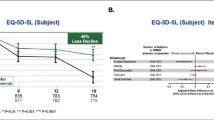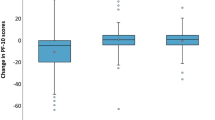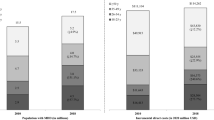Abstract
Purpose
To examine the impact of pre-diagnosis depressive symptoms and mental health-related quality of life (HRQOL) on survival among older patients with multiple myeloma (MM).
Methods
We performed a retrospective cohort study using the Surveillance, Epidemiology, and End Results-Medicare Health Outcomes Survey data resource. Patients aged 65 years and older diagnosed with first primary MM between 1998 and 2014 were identified, and presence of depressive symptoms was determined based on responses to 3 depression screening questions prior to MM diagnosis. Veterans RAND 12 mental component summary (MCS) scores were analyzed to evaluate mental HRQOL. We used multivariable Cox proportional hazards models to estimate hazard ratios (HR) and 95% confidence intervals (CI) for risks of all-cause and cancer-specific mortality.
Results
Of 522 patients, mean (SD) age at diagnosis was 76.9 (6.1) years and 158 (30%) reported depressive symptoms. Patients with depressive symptoms had a higher number of comorbid conditions and nearly all (84%) scored below the median MCS. Pre-diagnosis depressive symptoms were not associated with all-cause (HR = 1.01, 95% CI 0.79–1.29) or cancer-specific mortality (HR = 0.94, 95% CI 0.69–1.28). MM patients scoring in the second MCS tertile (vs the highest tertile) had a modestly increased risk of all-cause (HR = 1.19, 95% CI 0.91–1.55) and cancer-specific mortality (HR = 1.17, 95% CI 0.86–1.60), but these estimates were not statistically significant.
Conclusion
Pre-diagnosis depressive symptoms and lower mental HRQoL did not impact survival among older MM patients. Highly prevalent depressive symptoms among older MM patients deserve clinical attention. Such efforts can inform clinicians in tailoring care for this vulnerable population.

Similar content being viewed by others
Data availability
The authors have full control of all primary data. The data that support the findings of this study are available from the SEER-Medicare Health Outcomes Survey data resource. Restrictions apply to the availability of these data, which were used under license for this study.
References
Palumbo A, Anderson K (2011) Multiple myeloma. N Engl J Med 364(11):1046–1060. https://doi.org/10.1056/NEJMra1011442
Kyle RA, Gertz MA, Witzig TE, Lust JA, Lacy MQ, Dispenzieri A, Fonseca R, Rajkumar SV, Offord JR, Larson DR, Plevak ME, Therneau TM, Greipp PR (2003) Review of 1027 patients with newly diagnosed multiple myeloma. Mayo Clin Proc 78(1):21–33. https://doi.org/10.4065/78.1.21
Cancer Stat Facts: Myeloma. National Cancer Institute. Bethesda, MD. https://seer.cancer.gov/statfacts/html/mulmy.html. Accessed March 28th, 2019
Bell JR (1997) Underdiagnosis of depression in primary care: by accident or design? JAMA 277(18):1433
Serby M, Yu M (2003) Overview: depression in the elderly. Mt Sinai J Med 70(1):38–44
Djernes JK (2006) Prevalence and predictors of depression in populations of elderly: a review. Acta Psychiatr Scand 113(5):372–387. https://doi.org/10.1111/j.1600-0447.2006.00770.x
Lutgendorf SK, Andersen BL (2015) Biobehavioral approaches to cancer progression and survival: mechanisms and interventions. Am Psychol 70(2):186–197. https://doi.org/10.1037/a0035730
Bortolato B, Hyphantis TN, Valpione S, Perini G, Maes M, Morris G, Kubera M, Köhler CA, Fernandes BS, Stubbs B, Pavlidis N, Carvalho AF (2017) Depression in cancer: the many biobehavioral pathways driving tumor progression. Cancer Treat Rev 52:58–70. https://doi.org/10.1016/j.ctrv.2016.11.004
Buscariollo DL, Cronin AM, Borstelmann NA, Punglia RS (2019) Impact of pre-diagnosis depressive symptoms and health-related quality of life on treatment choice for ductal carcinoma in situ and stage I breast cancer in older women. Breast Cancer Res Treat 173(3):709–717. https://doi.org/10.1007/s10549-018-5006-5
El-Jawahri A, Chen YB, Brazauskas R, He N, Lee SJ, Knight JM et al (2017) Impact of pre-transplant depression on outcomes of allogeneic and autologous hematopoietic stem cell transplantation. Cancer 123(10):1828–1838. https://doi.org/10.1002/cncr.30546
Fann JR, Thomas-Rich AM, Katon WJ, Cowley D, Pepping M, McGregor BA, Gralow J (2008) Major depression after breast cancer: a review of epidemiology and treatment. Gen Hosp Psychiatry 30(2):112–126. https://doi.org/10.1016/j.genhosppsych.2007.10.008
Calip GS, Xing S, Jun DH, Lee WJ, Hoskins KF, Ko NY (2017) Polypharmacy and adherence to adjuvant endocrine therapy for breast cancer. J Oncol Pract 13(5):e451–ee62. https://doi.org/10.1200/JOP.2016.018317
Liang X, Margolis KL, Hendryx M, Reeves K, Wassertheil-Smoller S, Weitlauf J, Danhauer SC, Chlebowski RT, Caan B, Qi L, Lane D, Lavasani S, Luo J (2017) Effect of depression before breast cancer diagnosis on mortality among postmenopausal women. Cancer 123(16):3107–3115. https://doi.org/10.1002/cncr.30688
Mols F, Husson O, Roukema JA, van de Poll-Franse LV (2013) Depressive symptoms are a risk factor for all-cause mortality: results from a prospective population-based study among 3,080 cancer survivors from the PROFILES registry. J Cancer Surviv 7(3):484–492. https://doi.org/10.1007/s11764-013-0286-6
Pinquart M, Duberstein PR (2010) Depression and cancer mortality: a meta-analysis. Psychol Med 40(11):1797–1810. https://doi.org/10.1017/S0033291709992285
Satin JR, Linden W, Phillips MJ (2009) Depression as a predictor of disease progression and mortality in cancer patients: a meta-analysis. Cancer 115(22):5349–5361. https://doi.org/10.1002/cncr.24561
Lutgendorf SK, De Geest K, Bender D, Ahmed A, Goodheart MJ, Dahmoush L et al (2012) Social influences on clinical outcomes of patients with ovarian cancer. J Clin Oncol 30(23):2885–2890. https://doi.org/10.1200/JCO.2011.39.4411
Doll KM, Pinheiro LC, Reeve BB (2017) Pre-diagnosis health-related quality of life, surgery, and survival in women with advanced epithelial ovarian cancer: a SEER-MHOS study. Gynecol Oncol 144(2):348–353. https://doi.org/10.1016/j.ygyno.2016.12.005
Pinheiro LC, Reeve BB (2018) Investigating the prognostic ability of health-related quality of life on survival: a prospective cohort study of adults with lung cancer. Support Care Cancer 26(11):3925–3932. https://doi.org/10.1007/s00520-018-4265-3
Pinheiro LC, Zagar TM, Reeve BB (2017) The prognostic value of pre-diagnosis health-related quality of life on survival: a prospective cohort study of older Americans with lung cancer. Qual Life Res 26(7):1703–1712. https://doi.org/10.1007/s11136-017-1515-7
Reeve BB, Potosky AL, Smith AW, Han PK, Hays RD, Davis WW, Arora NK, Haffer SC, Clauser SB (2009) Impact of cancer on health-related quality of life of older Americans. J Natl Cancer Inst 101(12):860–868. https://doi.org/10.1093/jnci/djp123
Ambs A, Warren JL, Bellizzi KM, Topor M, Haffer SC, Clauser SB (2008) Overview of the SEER--Medicare Health Outcomes Survey linked dataset. Health Care Financ Rev 29(4):5–21
Overview of the SEER Program. https://seer.cancer.gov/about/overview.html. Accessed March 28th, 2019
Warren JL, Klabunde CN, Schrag D, Bach PB, Riley GF (2002) Overview of the SEER-Medicare data: content, research applications, and generalizability to the United States elderly population. Med Care 40(8 Suppl):IV-3–IV18. https://doi.org/10.1097/01.MLR.0000020942.47004.03
SEER-MHOS Response Rates. 2018. https://healthcaredelivery.cancer.gov/seer-mhos/aboutdata/table.response.rates.html. Accessed March 28th, 2019
Clark CJ, Fino NF, Liang JH, Hiller D, Bohl J (2016) Depressive symptoms in older long-term colorectal cancer survivors: a population-based analysis using the SEER-Medicare healthcare outcomes survey. Support Care Cancer 24(9):3907–3914. https://doi.org/10.1007/s00520-016-3227-x
White AJ, Reeve BB, Chen RC, Stover AM, Irwin DE (2014) Coexistence of urinary incontinence and major depressive disorder with health-related quality of life in older Americans with and without cancer. J Cancer Surviv 8(3):497–507. https://doi.org/10.1007/s11764-014-0360-8
Rost K, Burnam MA, Smith GR (1993) Development of screeners for depressive disorders and substance disorder history. Med Care 31(3):189–200
Whooley MA, Avins AL, Miranda J, Browner WS (1997) Case-finding instruments for depression. Two questions are as good as many. J Gen Intern Med 12(7):439–445
Selim AJ, Rogers W, Fleishman JA, Qian SX, Fincke BG, Rothendler JA, Kazis LE (2009) Updated U.S. population standard for the Veterans RAND 12-item Health Survey (VR-12). Qual Life Res 18(1):43–52. https://doi.org/10.1007/s11136-008-9418-2
Fleishman JA, Selim AJ, Kazis LE (2010) Deriving SF-12v2 physical and mental health summary scores: a comparison of different scoring algorithms. Qual Life Res 19(2):231–241. https://doi.org/10.1007/s11136-009-9582-z
Varadhan R, Weiss CO, Segal JB, Wu AW, Scharfstein D, Boyd C (2010) Evaluating health outcomes in the presence of competing risks: a review of statistical methods and clinical applications. Med Care 48(6 Suppl):S96–105. doi:https://doi.org/10.1097/MLR.0b013e3181d99107
Mian HS, Wildes TM, Fiala MA (2018) Development of a Medicare Health Outcomes Survey Deficit-Accumulation Frailty Index and its application to older patients with newly diagnosed multiplemyeloma. JCO Clin Cancer Inform 2:1–13. https://doi.org/10.1200/cci.18.00043
Kent EE, Ambs A, Mitchell SA, Clauser SB, Smith AW, Hays RD (2015) Health-related quality of life in older adult survivors of selected cancers: data from the SEER-MHOS linkage. Cancer 121(5):758–765. https://doi.org/10.1002/cncr.29119
Martino SC, Elliott MN, Haviland AM, Saliba D, Burkhart Q, Kanouse DE (2016) Comparing the health care experiences of Medicare beneficiaries with and without depressive symptoms in Medicare managed care versus fee-for-service. Health Serv Res 51(3):1002–1020. https://doi.org/10.1111/1475-6773.12359
Pourat N, Kagawa-Singer M, Wallace SP (2006) Are managed care Medicare beneficiaries with chronic conditions satisfied with their care? J Aging Health 18(1):70–90. https://doi.org/10.1177/0898264305280997
Seiler A, Jenewein J (2019) Resilience in cancer patients. Front Psychiatry 10:208. https://doi.org/10.3389/fpsyt.2019.00208
Dickens AP, Richards SH, Greaves CJ, Campbell JL (2011) Interventions targeting social isolation in older people: a systematic review. BMC Public Health 11:647. https://doi.org/10.1186/1471-2458-11-647
Duijts SF, van Egmond MP, Spelten E, van Muijen P, Anema JR, van der Beek AJ (2014) Physical and psychosocial problems in cancer survivors beyond return to work: a systematic review. Psychooncology 23(5):481–492. https://doi.org/10.1002/pon.3467
Acknowledgments
This study used data from the Surveillance, Epidemiology, and End Results (SEER)-Medicare Health Outcomes Survey (MHOS) linked data resource. The authors acknowledge the efforts of the National Cancer Institute; the Centers for Medicare and Medicaid Services; MHOS; Information Management Services, Inc.; and the SEER Program tumor registries in the creation of the SEER-MHOS database. The National Cancer Institute provided suggested edits and approval of the manuscript before final journal submission.
Funding
Dr. Patel received consultancy (Celgene, Janssen) and honoraria (Celgene, Janssen, Amgen). Dr. Calip was supported by the National Institutes of Health, National Center for Advancing Translational Sciences, through grant number KL2TR002002 and the National Heart, Lung and Blood Institute through grant number R21HL140531. Dr. Chiu was supported by the National Cancer Institute through grant number R01CA223662. The content is solely the responsibility of the authors and does not necessarily represent the official views of the National Institutes of Health.
Author information
Authors and Affiliations
Contributions
All authors contributed to the study conception and design. Material preparation, data collection, and analysis were performed by Ali Alobaidi, Nadia A. Nabulsi, and Gregory S. Calip. The first draft of the manuscript was written by Ali Alobaidi and all authors commented on previous versions of the manuscript. All authors read and approved the final manuscript.
Corresponding author
Ethics declarations
Ethical approval
The data used in the present study were de-identified and compliant with the Health Insurance Portability and Accountability Act; this study was determined to be exempt by the Institutional Review Board of the University of Illinois at Chicago.
Informed consent
The Institutional Review Board of the University of Illinois at Chicago determined this study to be exempt from obtaining informed consent from individual participants.
Conflict of interest
The authors declare that they have no competing interests.
Additional information
Publisher’s note
Springer Nature remains neutral with regard to jurisdictional claims in published maps and institutional affiliations.
Electronic supplementary material
ESM 1
(DOCX 69 kb)
Rights and permissions
About this article
Cite this article
Alobaidi, A., Nabulsi, N.A., Talon, B. et al. Depressive symptoms, mental health-related quality of life, and survival among older patients with multiple myeloma. Support Care Cancer 28, 4097–4106 (2020). https://doi.org/10.1007/s00520-019-05246-6
Received:
Accepted:
Published:
Issue Date:
DOI: https://doi.org/10.1007/s00520-019-05246-6




